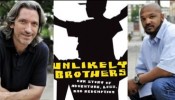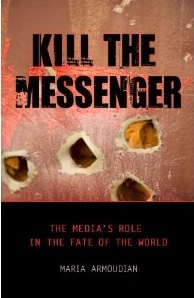Q&A: JOHN PRENDERGAST – co-founder of the Enough Project
Written on July 6th, 2014 |
Aired 12/25/11
As an activist, presidential advisor, cofounder of the Enough Project, and the author of ten books on Africa, including his most recent, The Enough Moment, John is passionate about ending genocide and raising awareness about human rights issues in Africa.
But the not-so-public face of John Prendergast is the life he’s led as a Big Brother to Michael Mattocks. As an emotionally wounded twenty-one-year-old, John made the life-changing decision to form a “Big Brother/Little Brother” relationship with then seven-year-old Michael, who was living out of plastic bags and roaming from one homeless shelter to the next with his mother and siblings.
In a book they wrote together, UNLIKELY BROTHERS: Our Story of Adventure, Loss, and Redemption, John and Michael share their experiences over the past twenty-five years. As John became more and more involved with Africa, he became less and less involved with Michael, who dropped out of school and into drug dealing. The two slowly disconnected and then reconnected at a critical moment for both of them.
JOHN PRENDERGAST is the co-founder of the Enough Project, an initiative to end genocide and crimes against humanity affiliated with the Center for American Progress. John has worked for the Clinton White House, the State Department, two members of Congress, the National Intelligence Council, UNICEF, Human Rights Watch, the International Crisis Group, and the U.S. Institute of Peace, and is the author or co-author of ten books. His previous two books were co-authored with Don Cheadle: Not On Our Watch, and The Enough Moment: Fighting to End Africa’s Worst Human Rights Crimes. John is a board member and serves as Strategic Advisor to Not On Our Watch.
MICHAEL MATTOCKS lived in homeless shelters as a child and began dealing drugs as a teenager. He is now a husband and father of five boys, working two jobs at once in order to support his family. He helps coach his sons on their football teams.
Q&A: Heather Courtney – Director / Producer, WHERE SOLDIERS COME FROM
Written on December 20th, 2011 |
Aired 11/07/11
From a small town in Northern Michigan to the mountains of Afghanistan and back, a raw and powerful documentary WHERE SOLDIERS COME FROM follows the four-year journey of childhood friends, their families, and their town. At its heart a story about growing up, the film is an intimate look at the young men who fight our wars, where they come from, and their struggles when they return and try to fit back into their previous daily routines. On the podcast, HEATHER COURTNEY, producer/director of the documentary, is joined by DOMINIC FREDIANELLI, one of the young veterans she follows in the film.
Heather Courtney has directed and produced several documentary films including award-winners LETTERS FROM THE OTHER SIDE and LOS TRABAJADORES. She was recently named one of Film Independent’s Top 10 Filmmakers to Watch. LETTERS FROM THE OTHER SIDE was the Closing Night film at the Slamdance Film Festival in January 2006. LOS TRABAJADORES won the Audience Award at SXSW and the International Documentary Association David Wolper award. She spent eight years writing and photographing for the United Nations and several refugee and immigrant rights organizations, including in the Rwandan refugee camps after the 1994 Rwandan genocide.
Just a quick reminder that the Indie Spirit Award-nominated film WHERE SOLDIERS COME FROM is now available on DVD, and if you order today, you’ll get it by Christmas!
You can go to http://www.wheresoldierscomefrom.com/dvd.php or see info below for more info on ordering, to read some reviews and to watch the trailer.
Q&A: MARIA ARMOUDIAN, Journalist/Radio Host
Written on August 12th, 2011 |
Aired 08/08/11
KILL THE MESSENGER emerged from MARIA ARMOUDIAN's studies into the causes of genocide, war, peacemaking, democratization, and the protection of human rights and the environment, while she was working on her Ph.D. at the University of Southern California, as well as during her work as a broadcast journalist and public official. Looking across conflicts and policy successes and failures, she found that media (and media professionals) were among key factors in determining political outcomes, including matters of life and death.
Written in five parts, KILL THE MESSENGER shows how media fomented rage and genocide in Rwanda, the Holocaust and the Bosnian war; how they helped bring peace in the Northern Ireland Conflict and the war in Burundi; how media contributed to democratization and the protection of human rights in South Africa, Taiwan, Mexico, and Senegal, and how they aided both the destruction and rebuilding of democracy in Chile. In its final case study, Kill the Messenger explores the media's role in the fate of the world, as journalists disentangle the issue of climate change for the public.
The book's forward was written by Tom Hayden.
